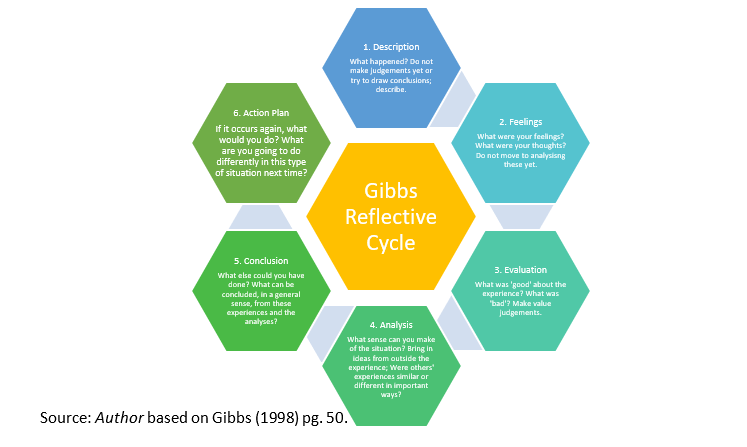As week one drew to a close, I discovered that at my current pace, the work would not be finished by the end of my placement. In order to improve this, I ensured to properly reflect on the use of my time throughout the week. The use of Gibbs Reflective Cycle (Gibbs, 1998) was most appropriate in order to discover where I was failing and how to improve. There are six key parts to Gibbs Reflective Cycle; Description, Feelings, Evaluation, Analysis, Conclusion and Action Plan.

Description:
Whilst content researching for the Working Travel Group, my pace was very slow. I had only gotten through 6 of the hotels in the first week, and if I were to continue at this pace I would not have been able to complete the work.
Feelings:
This left me feeling quite disheartened, and caused slight anxiety. I was worried about letting the placement supervisors down, and that I was not getting the most out the placement whilst working at such a slow pace.
Evaluation:
On reflection, it was beneficial that I discovered this lack of time management in the first week, as this gave me a while to improve my time management to ensure that all the work could be completed. However, this experience of being behind caused feelings of anxiety, and made me feel insecure when it came to work completion.
Analysis:
When reflecting on the first week of this placement, my lack of time management may be justified by the settling in process of beginning a new job. Gilmore and Harding (2021) have described this settling in process as one that is both traumatic and difficult to adjust to. This may give some insight as to why I managed my time poorly, as I was worried about the socialisation via Google Meet, and how I came across on camera. Also, this was the first time that I have worked remotely, and with lots of distractions at home, including a barking dog, adjusting to this was definitely a challenge.
Due to frequent contact with the other interns, we discussed where we were up to at the end of the week. We discovered that most of us were in a similar position, and that collectively we had poorly managed our time. This brought reassurance, as I was not the only intern who felt behind, and we deemed that familiarity with the system over the next few weeks would speed our process up.
Conclusion:
I can conclude that there were a variety of variables that influenced my poor time management. Whether these be my dog barking, the anxiety of starting the internship or thinking about how I was coming across in camera, all of these could have influenced my lack of good time management.
After this first week, I ensured that I was limiting the number of distractions that were around me, in order to concentrate on content researching for the Working Travel Group.
Action Plan:
In the following weeks, I removed most of the distractions around my workspace, and this significantly increased my work pace. Also, after the initial week, I felt more comfortable with the system and with the people I was virtually working with, and this also contributed to increasing my work flow.
If I were to find myself in this situation again, I would ensure that all distractions were removed from my workspace, and that I felt comfortable with the system I was using to complete any future work.
The use of the Gibbs Reflective Cycle has allowed me to identify the key reasons as to why I had poor time management in the first week of my work placement. Furthermore, this has aided my development within a virtual workplace and taught me how to remove distractions from my workspace, in order to increase productivity.
Hints and Tips: Always reflect on how you can improve your productivity. Removing unnecessary distractions from your workspace can help keep you on track with the task at hand.
Megan Curbishley.
Reference List:
Gibbs, G., 1998. Learning by doing: a guide to teaching and learning. London: FEU.
Gilmore, S, and Harding, N., 2021. Organizational socialization as kin-work: A psychoanalytic model of settling into a new job. Human Relations, pp.1-23.